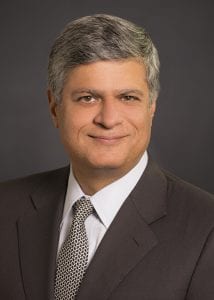 “I was 21 years old, and telecom had a buzz about it,” said Anand Malani, a Rice University graduate whose career would span major shifts in the telecommunications industry, including deregulation, cell phones, the internet and cloud.
“I was 21 years old, and telecom had a buzz about it,” said Anand Malani, a Rice University graduate whose career would span major shifts in the telecommunications industry, including deregulation, cell phones, the internet and cloud.
Malani (B.A. in CS ’85) worked as a telecom software engineer for Siemens, a company that provided switches and other devices used to transfer voice calls across traditional telephone wires.
“Although I thoroughly enjoyed problem solving in the context of computer programming,” he said, “our industry was changing at the national level. The telecom industry had been deregulated and AT&T split into nine or more companies.”
“After working for Siemens for several years, I reconnected with a high-school friend, an upperclassman who became a mentor to me. He was headed to Harvard Business School and as we talked, we realized all the action in telecommunications was occurring in management and government.”
For Malani to make an impact in the telecom industry, he needed an MBA. He chose the J.L. Kellogg School of Management at Northwestern University. When he graduated, the telecom industry was again in transition, with the advent of cell phones.
His first MBA-related job was to get Sprint into new businesses, including wireless. A few years later, MCI hired him for the same purpose.
“After MCI, I decided to do something really difficult and became a management consultant. MBAs usually join consulting right out of business school, not six years out. But Mitchell Madison Group wanted to build out their practice in the telecom industry and I had a sense that they were moving in the right direction and would be going places. It was a challenging move but a good one,” Malani said.
His management consulting experience, paired with his history in the telecom industry, attracted Cisco. The company was poised to help drive the next telecom industry transformation: the internet.
The internet was changing the way people lived, played and worked. When Malani joined Cisco in 2000, the company provided the routers that made up the backbone of the internet, making Cisco the most valuable company in the world.
“I joined Cisco to aid in the internet’s amazing second growth phase,” said Malani. “And my final role at Cisco was helping the company get into and run their cloud services business.”
“I was in the right spot during each of these new phases of the telecom industry: breaking up the telecom monopoly, the dawn of cellular, the growth of the internet and the advent of cloud. I feel privileged to have been at the heart of one of the biggest changes since the industrial revolution.”
Malani had also earned his leadership credentials, beginning with his first post-MBA role in the strategy development group that reported directly to Sprint’s CEO.
“I learned the strengths and weaknesses of Sprint and where it should go in the future. It was apparent the market was transitioning away from traditional long-distance service and Sprint had to diversify or die. Our team directed Sprint’s investments in cellular and other areas. Then MCI grabbed me because they were running behind on their diversification plans and needed my experience in telecom strategy development.”
At Cisco, Malani rotated through various divisional roles to learn the key functions of a large company, a typical career path for rising executives. With his final role as vice president for Cisco’s Cloud and Managed Services, Malani added general management to his portfolio of skills.
He now had experience in seven of the pillars critical for running a company: engineering, sales, services, product management, strategy development, mergers & acquisitions, and general management.
Then the telecom and technology industries began a transformation in tandem: connecting commercial products and processes to the Internet for an internet of things, or IoT. It posed interesting opportunities for his family’s business at the time Malani was beginning to search for a company to call his own.
“Perhaps it had always been in the back of my mind because my dad was an entrepreneur, but I wanted to take a medium-sized company to the next level. Ironically, I got the opportunity to run Malema,” said Malani.
Launched by his father and run by his brother, Malema Flow Sensors is part of an industry that has transitioned many times, from primitive river water monitoring tools to modern methods of measuring liquids and gases. Malema’s flow measuring and control devices are used in semiconductor, bio-pharma and chemical industries.
“Malema was already doing well and had a strong reputation for its products and engineering team. My job was to come in and scale the company, giving it the focus and structure to enable it to grow ten times its current size. It would require my general management expertise and strong functional leaders in sales, finance, R&D and manufacturing. A $20 million company works differently than a $200 million company.”
Malani sees his CEO position differently. Rather than being at the top of the pyramid, Malani feels he is at the bottom of an inverted pyramid. Each leader is given targets for the year and month. Then Malani steps back and gives them room to do their jobs.
 “After setting the direction and targets, my job is to lift any hurdles that might prevent our teams from achieving their goals. Working as a general manager requires me to rise above the trees and look down at the forest and plan the shape it needs to take. If necessary, I can dive in and count the leaves on each tree.”
“After setting the direction and targets, my job is to lift any hurdles that might prevent our teams from achieving their goals. Working as a general manager requires me to rise above the trees and look down at the forest and plan the shape it needs to take. If necessary, I can dive in and count the leaves on each tree.”
“I got that combination at Rice and Northwestern. Northwestern taught me how to look at the big picture. The critical ability to go deep and analyze, and to be able to stay there and focus until the problem is revealed and resolved, I got that at Rice. That combination has helped me forge my career, culminating in my CEO/general manager skill set.”
Malani’s career trajectory may seem carefully planned, but he said he follows six tenants:
- Choose things you are passionate about.
- Watch for opportunities during market transitions.
- Never turn away from a challenge. It will help build your skill set.
- Focus on results, not company politics.
- Be flexible. It’s a marathon, not a sprint.
- Family comes first.
“And go to Rice. It’s a phenomenal place,” he said.
Anand Malani completed his B.A. degree in Computer Science at Rice University in 1985.
